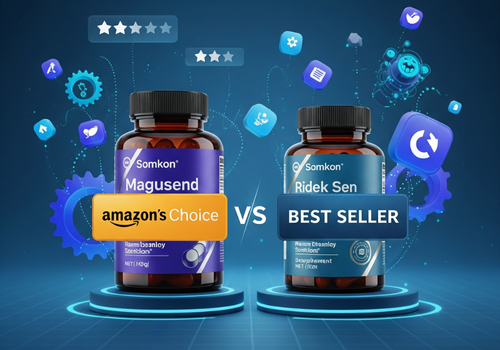Understand What Amazon’s Choice and Best Seller Badges Really Mean for Your Supplement
The Truth About the “Best Seller” Badge
The Best Seller badge on Amazon is awarded to products with the highest number of sales in a given category—such as multivitamins, probiotics, or fish oil supplements. However, just because a supplement is selling well doesn’t mean it’s effective, pure, or safe. Many best-selling supplements on Amazon succeed due to massive ad campaigns, steep discounts, or viral marketing, not because they’ve been verified for quality. It’s common to find these supplements filled with artificial fillers, underdosed ingredients, or hidden proprietary blends that make it impossible to judge the real potency. Consumers searching for the best supplements for energy, immunity, or sleep may fall into the trap of equating popularity with performance, when in fact the two are rarely connected.
Decoding “Amazon’s Choice” for Supplements
The Amazon’s Choice badge is algorithmically assigned to products that are frequently purchased, well-reviewed, Prime-eligible, and return-friendly for specific keyword searches like “vegan omega 3 Amazon” or “natural stress supplement.” But this badge doesn’t mean the product has been tested for purity, verified by third parties, or reviewed by medical experts. Many Amazon’s Choice supplements are chosen for search efficiency and customer service metrics—not safety or formulation quality. So, if you’re searching for clean supplements on Amazon or those with clinical-grade formulations, don’t let this badge create a false sense of confidence. Always go beyond the tag and look deeper into the product’s ingredients, testing standards, and brand transparency.
Why These Badges Can Be Misleading in the Wellness Space
Unlike tech gadgets or household goods, supplements directly affect your body. Yet Amazon’s badges don’t reflect anything about whether a product is manufactured in GMP-certified facilities, includes clinically proven dosages, or is free of contaminants. In some cases, best-selling supplements with these badges may contain non-bioavailable forms of nutrients that your body can’t even absorb properly. There have also been cases where products with trusted badges were found to be counterfeit, expired, or tampered with. Consumers looking for safe supplements online need to realize that these badges are purely marketing shortcuts—not proof of health value, and certainly not a substitute for independent quality verification.
High-Volume Sales ≠ High-Quality Supplements
Many shoppers assume that if a product is selling well, it must be effective. But when it comes to supplements, this couldn’t be further from the truth. Products with the highest sales often cut corners behind the scenes, using synthetic ingredients, cheap fillers, or misleading claims on labels. These products are rarely third-party tested and often lack crucial certifications like NSF Certified for Sport or USP Verified. If you’re searching for top-rated supplements on Amazon, especially for complex health concerns like hormone balance or digestive wellness, avoid assuming that high rankings equal high quality. Trust comes from transparency, not trending status.
Essential Quality Indicators Beyond the Badge
Rather than relying on badges, focus on what truly matters when evaluating a supplement. Clinical dosages and ingredient bioavailability are key—look for products using well-absorbed forms like magnesium glycinate or methylated B12 instead of cheaper, less effective alternatives. Also, make sure the product is tested by independent third-party labs, with certificates of analysis (COAs) available to prove purity and potency. Quality supplements will also display certifications like NSF, USP, or GMP, which show they’ve met rigorous manufacturing standards. Reputable brands are transparent about their supply chain and testing process, while badge-hunters often skip over these crucial details entirely.
Cross-Verify Brand Information Outside of Amazon
To protect your health and money, don’t rely solely on Amazon product pages. Visit the brand’s official website to cross-check claims. Legitimate companies are open about where their ingredients come from, whether they use organic or fair-trade sources, and whether any clinical trials or research back up their formulas. A product that proudly displays third-party testing, GMP compliance, and sourcing details is far more trustworthy than one that simply flaunts an Amazon badge. If a brand avoids discussing its process or refuses to show lab results, that’s a red flag—no matter how many reviews or badges they’ve earned.
Look for Verified Reviews and Detailed Feedback
Reviews are another area where Amazon shoppers can be misled. Instead of glancing at the star rating, read the detailed comments—especially those marked “Verified Purchase.” Genuine reviews often mention real health changes, side effects, or how the product compares to others. Be cautious of short, vague reviews that repeat similar phrases, as this may signal review manipulation. Hundreds of glowing reviews posted within a short timeframe can indicate that a product is using fake review schemes to gain an advantage in the supplement category. When trying to identify safe supplements online, authentic feedback is worth its weight in gold.
How to Shop Smarter and Safer on Amazon
To avoid falling into the marketing trap, start by treating these badges as one small part of your research process—not a final stamp of approval. Always prioritize supplements with clearly disclosed ingredient dosages, clinically proven compounds, and transparent third-party testing. Check the “Sold by” and “Shipped by” details to ensure you’re buying from the actual brand or a reliable fulfillment partner. Whenever possible, bookmark trusted supplement companies and compare their listings across multiple platforms. Smart shopping means going beyond what’s trending and learning how to identify quality through the facts—not just through flashy labels.
Conclusion:
Amazon’s “Best Seller” and “Amazon’s Choice” badges may be helpful starting points, but they should never replace your personal research—especially when your health is at stake. These tags are driven by algorithms and sales, not safety or science. To make smart choices, focus on supplement label transparency, clinical research, third-party testing, and honest reviews. Your body deserves supplements that have been truly vetted—not just marketed well. Skip the shortcuts and choose supplements with proof behind the promise. Because in the world of wellness, your decisions should be based on truth—not tags.

